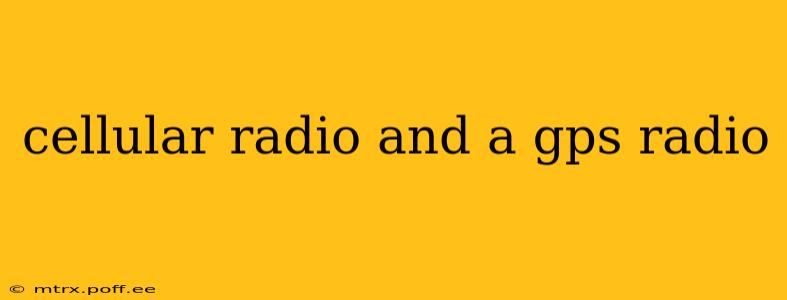Cellular radios and GPS radios are both integral parts of modern communication and navigation technology, but they operate on fundamentally different principles and serve distinct purposes. This article will delve into the key differences between these two technologies, clarifying their functions and applications.
What is a Cellular Radio?
A cellular radio, or simply a cellular connection, uses radio waves to transmit voice, data, and other information between mobile devices and a network of base stations. These base stations, also known as cell towers, are geographically distributed to provide widespread coverage. The communication relies on a complex network infrastructure that handles routing and switching calls and data between users. The technology behind cellular communication has evolved significantly over the years, with each generation (2G, 3G, 4G, and now 5G) offering increased speed, bandwidth, and capabilities.
What is a GPS Radio?
A GPS radio, or more accurately a GPS receiver, uses radio signals from a constellation of satellites orbiting the Earth to determine its precise location. These satellites continuously transmit signals containing information about their position and the current time. The GPS receiver compares these signals to determine its own location through a process called triangulation. Unlike cellular radios which require a network infrastructure, GPS receivers operate independently, relying solely on the signals from the satellites. While GPS radios don't transmit information themselves (at least not in the common consumer context), they receive and process information to determine location.
What are the Key Differences Between Cellular and GPS Radios?
The core differences between cellular and GPS radios lie in their functions, how they operate, and what they require to work:
Function:
- Cellular Radio: Primarily used for communication – voice calls, text messages, data transfer (internet access).
- GPS Radio: Primarily used for positioning – determining the precise location of a device.
Operation:
- Cellular Radio: Requires a network infrastructure (cell towers) and a cellular subscription for communication. It's a two-way communication system.
- GPS Radio: Operates independently using signals from GPS satellites. It's primarily a one-way system (receiving only).
Data Transmission:
- Cellular Radio: Transmits and receives large amounts of data at varying speeds depending on the network technology.
- GPS Radio: Primarily receives relatively small amounts of data from satellites, mainly time and position information.
Accuracy:
- Cellular Radio: Location accuracy varies considerably, depending on signal strength and network technology.
- GPS Radio: Can offer high accuracy (within a few meters) under ideal conditions, although accuracy can be affected by atmospheric conditions, obstructions, and the quality of the receiver.
Power Consumption:
- Cellular Radio: Generally consumes more power than a GPS receiver, especially during active data transmission.
- GPS Radio: Typically consumes less power, although continuous operation will still drain the battery.
How are Cellular and GPS Radios Used Together?
While distinct, cellular and GPS radios are often used together in devices such as smartphones and navigation systems. The GPS provides location data, while the cellular connection allows this location data to be transmitted to mapping services, shared with other devices, or used for location-based services. For instance, a ride-sharing app relies on the GPS to track the driver's location and the cellular network to communicate that location to the passenger and the app's servers.
What about other GNSS Systems?
While the term "GPS" is commonly used, it's important to note that it only refers to the US system. Other Global Navigation Satellite Systems (GNSS) exist, including GLONASS (Russia), Galileo (Europe), and BeiDou (China). Many receivers are capable of using signals from multiple GNSS systems for improved accuracy and reliability, particularly in areas with limited GPS visibility.
Can a GPS Radio Work Without a Cellular Connection?
Yes, a GPS receiver functions independently of a cellular connection. It relies solely on the signals from the satellites to determine location. However, many GPS devices use cellular connectivity to upload data, download maps, or for other features.
Can a Cellular Radio Work Without GPS?
Yes, a cellular radio can function perfectly well without GPS. It still allows for voice calls, text messages, and data transfer, but it will not be able to provide location information based on its own capabilities. However, the cellular network may provide approximate location information, but usually with lower accuracy than GPS.
By understanding the differences and interdependencies of cellular and GPS radios, we can appreciate their vital roles in modern communication and navigation technology. Their combined power fuels many of the technologies we rely on daily.
